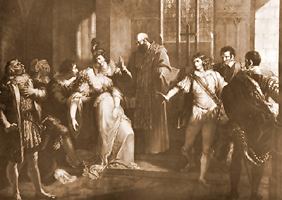
ACT IV
SCENE i
The wedding turns into a so-called "shaming scene." This is usually played too light; the scene is really very dark and an extreme character assassination based on the stereotypical conventionalism about women, virtue, and dishonor. Ultimately, blame will be laid on slanderous tongues, without any question of the men's own behavior.

|
Friar Francis begins the ceremony: "You come hither, my lord, to marry
this lady," but Claudio says "No" (IV.i.4-6). Leonato supplies a nervous
save: "To be married to her. Friar, you come to marry her"
(IV.i.7-8). But soon Claudio renounces Hero publicly as a "rotten orange"
(IV.i.32): "She's but the sign and semblance of her honor. / ... / She
knows the heat of a luxurious bed; / Her blush is guiltiness, not
modesty" (IV.i.33-42). Leonato makes an odd overture: "Dear my lord, if
you, in your own proof, / Have vanquish'd the resistance of her youth, /
And made defeat of her virginity--" (IV.i.45-47). So Leonato thinks
Claudio is having a fit at what a slut Hero is because she slept with
Claudio himself?!
|
Don Pedro backs up Claudio in a showing of preference for "male bonding and homosociality" (Garber 385): "I stand dishonor'd, that have gone about / To link my dear friend to a common stale" (IV.i.64-65). Gradually, even Leonato is convinced, and laments, "Hath no man's dagger here a point for me? (IV.i.109). Hero faints; her father wishes her dead. Interestingly, Benedick is the only one who believes the women at this shaming scene: "be patient. / For my part I am so attir'd in wonder, / I know not what to say" (IV.i.144-145). He soon starts to suspect "John the Bastard" (IV.i.188).
The officiating friar, "By noting of the lady" (IV.i.158), comes to detect something fishy. He presents a plan whereby if they all thought Hero had died, this all might turn out better. (Of course, one gets nervous when priests and friars have fake death plans for lovers in Shakespeare). Hero is to be led away by the friar: "Come, lady, die to live" (IV.i.253), "to a place where she cannot be 'noted'" (Garber 380).
Beatrice, left alone with Benedick, is furious at the slander and states three times that she wishes she were a man. This ventures beyond gender politics and into savagery; she raves, "I would eat his heart in the market-place" (IV.i.306-307). All along she has resented expectations of female subordination. She ends up neither humbled nor condemned though in the end for this. Under these stressful circumstances, Benedick and Beatrice acknowledge their love for each other (without sinking into a bathos of sentimentality, of course) and immediately get back to the business at hand. When Benedick swears to obey her bidding, she commands, "Kill Claudio" (IV.i.289), which even if taken symbolically would mean that Benedick must choose between his old world of male friendships and the new world of love. He didn't leave the church with Don Pedro, Claudio, and Don John, so already there are signs of his break from the all-male soldiery (cf. II.i.175f). But how is this moment played? for laughs? And if so, is it the laughter of amusement or of nervous defensiveness (Wells 169)? Benedick does commit himself to her though: "Enough, I am engag'd, I will challenge him" (IV.i.331-332).
SCENE ii
Dogberry conducts legal business regarding Borachio and Conrade's evil deeds. His bumbling officiousness and malapropisms tend to hinder matters. When the proceedings draw to a close and Conrade calls Dogberry an ass, Dogberry is seriously perturbed:
Dost thou not suspect my place? Dost thou not suspect my years? O that he were here to write me down an ass! But, masters, remember that I am an ass; though it not be written down, yet forget not that I am an ass. (IV.ii.74-78).Dogberry would have liked this libelous offense recorded, and therefore keeps repeating from here on out -- implying let it not be forgotten that the villain said -- "I am an ass."
This is "one of several Shakespeare plays to juxtapose overtly the spoken and the written, and in this play the latter is often called upon to stabilize or interpret the former" (Garber 389). The charges and the bungling are all probably inspired by Howard and Arundel's charges against Oxford (Clark 550-551), particularly Arundel's libels and his use of a "confusing numbering system to enumerate de Vere's vices" (Anderson 169, 186).